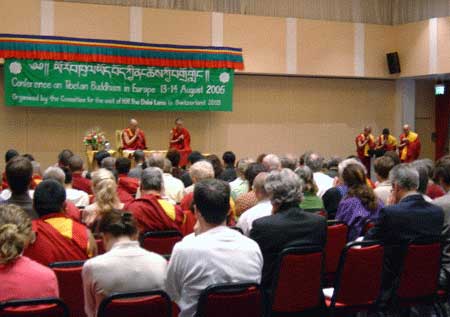Conference on Tibetan Buddhism in Europe held in Switzerland August 13-14, 2005
By Tenzin Samphel Kayta, Tibet Bureau, August 16, 2005
Zurich, Switzerland -- A Conference on Tibetan Buddhism in Europe was held in Zurich on August 13 -14, 2005. His Holiness the Dalai Lama inaugurated the Conference, the first of its kind held in Europe, organised by the Committee for The Dalai Lama in Switzerland 2005.

Geshe Jampel Senge, in his opening remarks outlined the theme of the Conference, namely, how best to preserve the essence of Tibetan Buddhism in a changing world; how Buddhism can contribute to help others without the intention of proselytising, and how to reach and cooperate with other traditions on a global level.
Mr. Jampa T. Samdho, on behalf of the organisers welcomed the delegates and thanked His Holiness for inaugurating the Conference.
Tibetan Buddhist teachers and representatives from sixteen nations across the European continent and a guest speaker, Argya Rinpoche from the US attended the Conference. These include Dagyab Rinpoche, Sogyal Rinpoche, Tulku Pema Wangyal, Thamthog Rinpoche, Lama Karta, Sherab Gyaltsen Amipa, Phuntsok Tashi, Abbot of Rikon Monastery, Alex Berzin, Ani la Carola Roloff, and Martin Kallf.
Representatives from over 80 Buddhist Centres in Europe participated in the Conference.
His Holiness the Dalai Lama delivered the keynote speech to the Conference. His Holiness said that the discussions should be free and frank and discuss everything so that we can find remedies, if necessary.
His Holiness called for communication, cooperation and common responsibility to make the Conference meaningful. He also gave hearty support to revive the Bikshuni vow and donated CHF 50,000.00 as a pilot fund to realize this goal and suggested that perhaps the western nuns should take the lead by exploring ways to do more study and research in consultation with Buddhist leaders in some the Asian countries where Buddhism is the major religion.
He also suggested reaching out to our Muslim brothers and sisters across the globe. His Holiness said the Tibetans had isolated themselves from the rest of the world in order to preserve the things that were most dear to them but what happened was the opposite: it undermined the very basis and so today we are faced with a very critical situation in our Tibetan history of losing everything. So it is not always wise to remain in isolation.
His Holiness also agreed with the suggestion by one of the speakers, that the Buddhist centres in the west could do a better job in supporting the cause of Tibet after all it affects the very survival of Tibetan Buddhism.
Some of the teachers gave their personal opinions with rare frankness and unbridled enthusiasm. Three groups were created to discuss in depth about the theme of the conference and other relevant issues. The atmosphere of the whole meeting was open, clear, committed and very friendly. Everybody put in their best efforts and on morning 14 August, the three groups reported their findings with a Tibetan and Western scholar so that both perspectives received equal attention.
What came up during the group discussions was the need to stay connected with each other and have this kind of conference in future to bring an understanding not only among the centres themselves but also among the four different traditions of Tibetan Buddhism.
There was also a suggestion for the need to form an International Tibetan Buddhist Organization, a world body which will foresee the progress of Buddhism around the globe and also act as a watch dog to keep the purity of Tibetan Buddhism.


